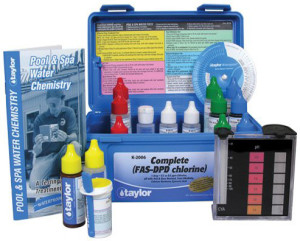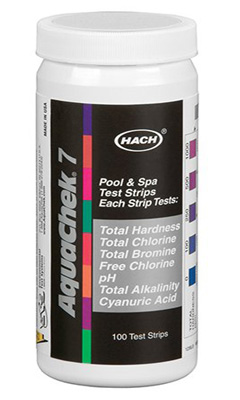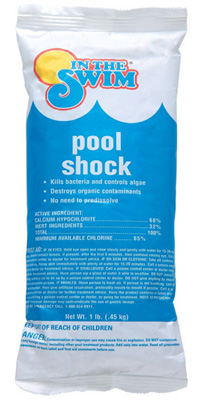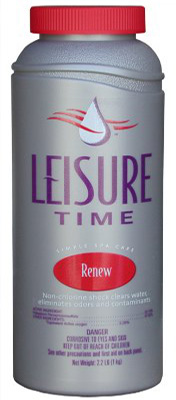Chloramines in swimming pools are the effect of inadequate free chlorine. It is also called combined chlorine. Normally it produces strong odor of chlorine around the swimming pool and the pool water. Chloramine loses to a great extent of chlorine’s disinfect power. It is about 70 times less effective than free chorine. The maximum acceptable level of chloramines is less than 0.5 mg/l. Chloroamine is readily soluble in water.
Chemically there are two composition of chlorine in pool water; free chlorine and combined chlorine. Free chlorine means – the amount of chlorine in the pool that can sanitize the water. On the other hand, combined chlorine – consists of undesirable, bad smelling, irritating compounds.
When chlorine is added into water, it creates hypochlorous acid (HOCl) and hypochlorite ion (OCl–). HOCl has a great powerful killing capacity, whereas OCl– is a weak killing capacity. PH is the indicator for determining of these two compounds. The total amount of HOCl and OCl– ion is the measure of free available chlorine. It is the active form of chlorine in the water. In addition, total chlorine means – is the total amount of active chlorine and combined chlorine.
| Table of Contents: |
Chemical formula for chloramine
Nitrogen compounds react with active chlorine (hypochlorous acid – HOCl) produces chloramines in swimming pools. The Chloramines may be two types inorganic or organic Chloramines.
monochloramine : HOCl + NH3 → NH2Cl + H2O
NH3 + OCl– → NH2Cl + HO–
dichloramine: NH2Cl + NH3 → NHCl2 + H2O
trichloramine: NHCl2 + NH3 → NCl3 + H2O
The chemical formula for organic chloramines is R2NCl and RNCl2. Where R is represent an organic group.
Introducing nitrogen compounds
The nitrogen is most commonly introduced into the pool water as ammonia in the form of sweat and urine of swimmers and bathers. Nitrogen compounds can also introduced into the pool water by rain, oils. Moreover, some pool water chemicals contain nitrogen compounds and phosphates. All these are responsible for increasing chloramines in swimming pools.
Chloramine test
There is no direct chloramine test strips to test the Combined chlorine. Combined chlorine (chloramines) is calculated indirectly by testing free chlorine and total chlorine. We know that total chlorine is equal to the combination of free chlorine and Combined chlorine. Hence, combined chlorine is the difference between free Chlorine reading and the total Chlorine reading.
combined chlorine = total chlorine – free chlorine
You can buy different free Chlorine and total Chlorine test strips or reagents in many market places such as Amazon. Normally, total chlorine test kits are marked “OTO” in the reagent bottle.
- Free Chlorine and total Chlorine test kit

TAYLOR TECHNOLOGIES INC K-2006 TEST KIT COMP CHLORINE FAS-DPD
- Free Chlorine and total Chlorine test strips

AquaChek 551236 7-Way 100 Count Pool Water Test Strips
Chloramines side effects
If the combined chlorine too high in pool water then the smell of chlorine spread around the swimming pool. It has many side effects. Some physical Chloramines side effects are red burning eyes, burning sensation in nose, bleeding lips, dry mouth and throat, dry itchy skin and hair, aggravate eczema and psoriasis. It can also cause breathing difficulty especial to young children swimmers and asthma patients. Moreover, chloramines can damages digestive mucosa, worsen gastric cancer, liver or kidney disease and may discolor the pool.
How to remove chloramine from water
Chloramines generate characteristic smell in the around swimming pool and pool water. So, how to remove chloramine from water? – To remove chloramine from water can be used different chlorine or non chlorine shocks. These socks destroy the ammonia and organic compounds that combine with chlorine and make chloramines in swimming pools.
The following methods can be used to remove chloramine from water:
Super chlorination: Add over dosages of chlorine so that the level rise up 6 to 10 ppm and allowed to keep for 4-5 hours. If the dosage is not properly maintained then it is possible to produce more chloramines in swimming pools. At this time it is forbidden to use swimming pool; use pool water after dropping the chlorine level below 3 ppm.

In The Swim Chlorine Pool Shock – 24 X 1 lb. bags
Non chlorine shock: You can use non chlorine shock to remove chloramine from water. As a non chlorine shock most favorite chemical is potassium peroxymonosulfate and Hydrogen peroxide.

Leisure Time RENU2 Renew Non-Chlorine Shock
Ozone generator: You can also install ozone generator to remove chloramine from water of swimming pool. Ozone continuously removes chloramines in swimming pools by oxidizing ammonia and nitrogen compounds.
UV light: Recent studies on pool water suggest that ultra violet (UV) light systems can reduce chloramines concentrations significantly from pool water. In addition it has also disinfection activities; it may inactivate anti-chlorine micro-organisms such as parasitic protozoans and Giardia lamblia.
You can minimize the creation of chloramines by Showering before swimming.
The indoor swimming pool should be keep proper ventilation systems. A ventilation system desires to be well designed.
Chloramines producing ammonia can also be removed from pool water by adding granulated activated carbon, zeolite or volcanic ash into the filters.
Chloramines in swimming pools can also be minimizing by diluting with fresh water. It is recommended that the fresh water must be containing less concentrated of chloramines.